|
|
|
Sort Order |
|
|
|
Items / Page
|
|
|
|
|
|
|
| Srl | Item |
| 1 |
ID:
139119
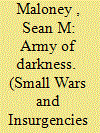

|
|
|
|
|
| Summary/Abstract |
The current Islamic State in Iraq and Syria displays both Taliban and al Qaeda-like characteristics. We can expect IS to host international jihadists in the same way the Taliban did between 1996 and 2001. This study depicts the jihadist training and support network established in Afghanistan during those years prior to its dismantlement and exploitation by Operation ENDURING FREEDOM. Up to now this system was understood only in the abstract but with newly available information, the scope and scale of the international jihadist project in Afghanistan can be unveiled.
|
|
|
|
|
|
|
|
|
|
|
|
|
|
|
|
| 2 |
ID:
139118


|
|
|
|
|
| Summary/Abstract |
From 2006 to 2011, al Qaeda's East African proxy, al Shabaab, served as de facto ruling party of Somalia despite the efforts of the internationally recognized Transitional Federal Government (TFG). During these five years, a violent struggle between al Shabaab and the Burundian and Ugandan Peacekeepers of the African Union Mission in Somalia (AMISOM) resulted in thousands of dead civilians, hundreds of thousands of internally displaced persons, and a strategic environment inhospitable to reconciliation, recovery, or development. Beginning in August 2011, AMISOM was able to break the deadlock and force al Shabaab from Mogadishu, then subsequently, Kismayo, and ultimately to consolidate and reorganize in the Somali hinterland. In order to continue the momentum, the African Union and other partner nations must support the newly recognized Somali Federal Government (SFG), neutralize al Shabaab, and provide good governance to its constituents. Al Shabaab's revenue streams must be shut down and their offensive capability must be degraded while the strategic environment is shaped to ensure that conditions conducive to a revival do not exist. Failure to do so will likely see Somalia continuing to produce Islamic extremists and pirates to menace international maritime traffic in the Western Indian Ocean, destabilize East Africa, and adversely impact millions.
|
|
|
|
|
|
|
|
|
|
|
|
|
|
|
|
| 3 |
ID:
139114
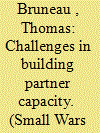

|
|
|
|
|
| Summary/Abstract |
The main emphasis in US security assistance is ‘building partner capacity’. To understand prospects for building capacity implies knowledge of the security sector, including the armed forces and also national police and intelligence agencies. The scholarly sub-discipline that should be useful for analysis of a nation's use of armed forces is civil–military relations as it ostensibly directs attention to when and how civilians choose to utilize their nation's armed forces. The goal in this article is to further refine the field of civil–military relations by focusing attention on two main concepts – democratic civilian control and strategy – and discussing their relevance in the context of building partner capacity.
|
|
|
|
|
|
|
|
|
|
|
|
|
|
|
|
| 4 |
ID:
139110
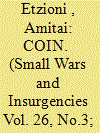

|
|
|
|
|
| Summary/Abstract |
Has the US military become a learning institution, one able to transition from relying on a conventional war model to fighting against irregular adversaries such as insurgents and terrorists? This article examines the United States' interventions in Iraq and Afghanistan in an effort to respond to this question. It shows that there are two major ways for a military to fail to be a ‘learning’ institution: It may stick to its old dogma or – adopt a flawed new one. Those who saw counterinsurgency (COIN) doctrine as the best way to stabilize Iraq and Afghanistan made the US military into a learning organization – but taught it the wrong lesson. They failed to take into account the absence of the sociological conditions that make a post-conflict environment amenable to nation-building, which is an integral part of the main variants of counterinsurgency. The article closes by outlining the foremost reasons the US military continues to be a poorly adaptive organization.
|
|
|
|
|
|
|
|
|
|
|
|
|
|
|
|
| 5 |
ID:
139111
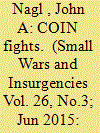

|
|
|
|
|
| Summary/Abstract |
Etzioni both exaggerates and minimizes the influence of my book Learning to Eat Soup with a Knife on different components of US military doctrine, mischaracterizes my treatment of the Malayan Emergency, and unfairly denigrates the successes of counterinsurgency in Iraq from 2007 to 2011 while misattributing the reasons for its failures in both Iraq and Afghanistan.
|
|
|
|
|
|
|
|
|
|
|
|
|
|
|
|
| 6 |
ID:
139113
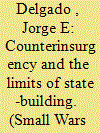

|
|
|
|
|
| Summary/Abstract |
Since 2002 the Colombian government has been implementing a series of policy initiatives that have sought to coordinate state resources in a neo-classical counterinsurgency approach to fight the country's main insurgent group, the Fuerzas Armadas Revolucionarias de Colombia (FARC), and recover and consolidate the territory. Despite impressive operational successes against the insurgency and other illegal groups, the government has been unable to reassert its control and build legitimacy via the state-building effort known as ‘Consolidación’, in some of the most recalcitrant areas of the country. This article examines two areas where government efforts at consolidation appear to be failing to discuss the limits of COIN theory and practice.
|
|
|
|
|
|
|
|
|
|
|
|
|
|
|
|
| 7 |
ID:
139116


|
|
|
|
|
| Summary/Abstract |
The Romanian anti-communist partisans constituted a small, scattered, diffused, and leaderless movement united only by nationalism and by the belief that armed struggle would contribute to the downfall of an illegitimate regime supported by a foreign power. This article provides an analysis of intelligence and intelligence operations used by the government to defeat these guerrillas, in a conflict that lasted a decade and a half. The sources for this study are mainly the collections of documents of Romanian secret police recently declassified and published.
|
|
|
|
|
|
|
|
|
|
|
|
|
|
|
|
| 8 |
ID:
139120
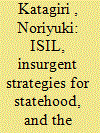

|
|
|
|
|
| Summary/Abstract |
What do we know about the US-led coalition's chance of defeating the Islamic State in Iraq and the Levant (ISIL)? Exploring a number of past wars between state and non-state forces, I argue that while the war with ISIL may become protracted and last long, ISIL's chance of winning is after all slim. Primary reasons for this optimism lie in the combination of ISIL's self-destructive actions, which are likely to alienate much of its popular and financial base, and the transformation of US-led military operations in Iraq and Syria.
|
|
|
|
|
|
|
|
|
|
|
|
|
|
|
|
| 9 |
ID:
139115
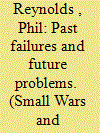

|
|
|
|
|
| Summary/Abstract |
Personal cognitive processes inform how individuals understand their environment. Cultural variation, fundamental attribution error, causal attribution, and durability bias create obstacles to Western understanding of irregular war and have created a significant institutional bias in how the US military perceives its enemies- a perception only somewhat softened after a decade of irregular war. United Special Operations Command (USSOCOM) is in a better position to overcome these problems through persistent engagement. In the event of major conflict, environmentally sensitized military planners will be better able to achieve military and policy objectives.
|
|
|
|
|
|
|
|
|
|
|
|
|
|
|
|
| 10 |
ID:
139112
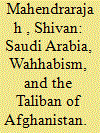

|
|
|
|
|
| Summary/Abstract |
This article argues that the Taliban's revolutionary war (RW) program is puritanical reform informed by the Islamic legal duty of al-amr bi'l-ma‘ruf wa'l-nahy ‘an al-munkar(‘commanding what is good and forbidding what is reprehensible’). It also examines the history of this duty with examples of puritanical reform movements emerging from Berber tribes in North Africa and tribes in Arabia. Furthermore, the importance of this duty in Wahhabi Saudi Arabia, and its exportation to Pakistan where Taliban leaders imbibed this ideology, are discussed. Finally the article shows that corruption and abuses by the Afghan regime have given impetus to puritanical reformers: the condition precedent for puritanical reform is pervasive wrongdoing in an Islamic society.
|
|
|
|
|
|
|
|
|
|
|
|
|
|
|
|
| 11 |
ID:
139117
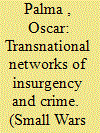

|
|
|
|
|
| Summary/Abstract |
The concept of commercial insurgency describes organisations permeated by criminal interests, especially when they participate in the production and trade of specific commodities. This article introduces a framework of analysis to explain how such organisations exploit elements through their region in order to embed militants beyond the borders of a single state. Through the construction of transnational networks, insurgents are able to perform political, military, and criminal activities, which not only contribute to the organisation's goal, but which also provide an opportunity for the insurgency to survive when the counterinsurgent offensive is strong within the primary theatre. This is a clear challenge for the state.
|
|
|
|
|
|
|
|
|
|
|
|
|
|
|
|
|
|
|
|
|